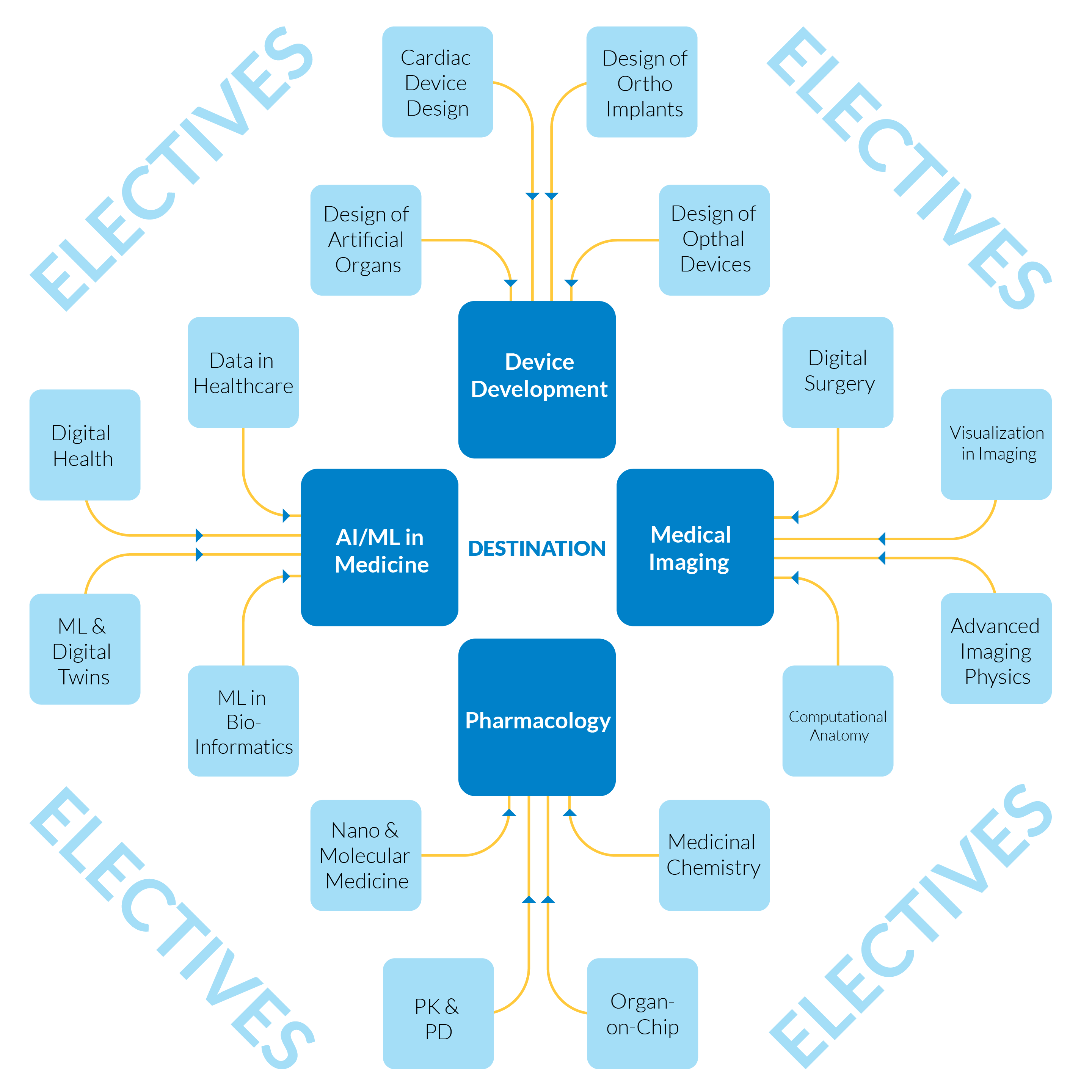Four Year BS Programme in Medical Sciences & Engineering
The Core Objective of the Programme is to develop World-Class Engineering Physiologists who will define the future of medicine.
A Macro view of the Programme
The BS Programme in Medical Sciences & Engineering is a game-changing interdisciplinary programme that bridges Medicine & Engineering
The course structure involves an internship in a hospital to tie theory and practice. The courses in the programme will be taught by both medical & engineering faculty, and will provide a strong research base for students.
The Structure of Physiology Courses offered by the programme include:
- Anatomy and Physiology of Organs
- Mathematical Modelling of the Organ System
- Pathology of the Organ System and its interaction with other systems
- Diagnostics / Measurement system and Treatment Protocols
The Programme will cover the following broad areas:
Basic engineering principles that are necessary to understand physiology
Fundamental sciences to understand physiology
Basics of mathematical methods, machine learning, medical imaging, etc to build mathematical structure
Application of these fundamentals to the functioning of physiological systems
Specialisation in one or more of the following areas:
Organ-specific Device Development
Artificial Intelligence applied to Health
Medical Image Analysis
Quantitative Pharmacology
Drug Design and Deployment
Translational Research in Medicine and Regulatory Processes
Fundamental Physiological Sciences
Admissions to BS in Medical Sciences & Engineering (2025)
Applications for BS in Medical Sciences & Engineering for the batch starting in 2025 are open on IIT Madras Admissions Portal.
Admissions will be through the IISER Aptitude Test (IAT). All applicants should register on the IISER Admissions Portal.
Once Registered, Applicants should apply on the IIT Madras Admission Portal.
Structure of the Programme
Finite Elements for Physiologists
Medical Genetics
Electives & Destinations

Doctors on the BS Programme
A group of highly accomplished doctors, some of whom were closely involved in the development of the curriculum, speak on the relevance and importance of the BS Programme in Medical Sciences & Engineering.
Industry Stakeholders on the BS Programme
Senior Executives from the Medical Devices industry give an industry perspective on the BS Programme in Medical Sciences & Engineering
Doctors on the BS Programme
A group of highly accomplished doctors, some of whom were closely involved in the development of the curriculum, speak on the relevance and importance of the BS Programme in Medical Sciences & Engineering.
Industry Stakeholders on the BS Programme
Senior Executives from the Medical Devices industry give an industry perspective on the BS Programme in Medical Sciences & Engineering
Experts’ Opinion on the BS Programme
“I was very happy to learn that IITM is initiating a new course which brings Engineering and Medical science on the same platform. This is a fine initiative as it will shorten the innovation cycle in healthcare. The curriculum will breakdown the traditional barriers between engineers and medical professionals. We from Carl Zeiss are keen to associate with the initiative and can play an effective role in the Ophthalmology space. I am excited, thinking of the various areas where we can collaborate, innovate and shape IITM’s research into products that our society can benefit from. I wish IITM good luck, and assure you of our participation in making your programme a grand success.”
“The BS Program in Medical Sciences, which will be housed at the Indian Institute of Technology Madras, is a timely and innovative platform for bridging the knowledge gaps between future engineers and health professionals. Solutions to the most complex problems facing the world require a coordinated, multidisciplinary approach. Many advances in health care have been crafted by teams of engineers and medical professionals working together. Team members who receive integrated training in both disciplines will be the most effective future leaders of these teams. The impressive and challenging curriculum that has been developed will be highly impactful for the BS program graduates.”
“The new medical sciences and engineering course at IIT Madras will help close the gap between clinicians and engineers, which is most essential to fulfilling the dream of “Make in India for the World” that we are chasing as a nation in the field of MedTech. This will be achieved by exposing the best engineering minds to real-life clinically weighted problems at an undergraduate level itself. Learning the details of human anatomy and physiology will motivate engineers to solve these problems utilizing the latest engineering tools. Also, the course will expose the students to the diagnostics techniques of today, which will help them to define the developmental challenges and goals with the help of clinical inputs.”
“This is an exciting proposal, one which I feel will usher in innovation in product and treatment paradigms. Scientific innovation requires a strong understanding of multiple disciplines. In our experience, innovation frequently occurs in inter-disciplinary areas. In the domain of medicine, delivering breakthrough treatments to patients involves both therapeutic products and the modalities to administer them. The proposed Medical Sciences programme would develop individuals who understand both the medical domain, as well as the technological. The graduates would be well positioned to drive innovation, and I am confident that this would result in new avenues in medicine.”
Frequently Asked Questions on the BS Programme are covered in the FAQ page. For further queries, please fill the form below:
